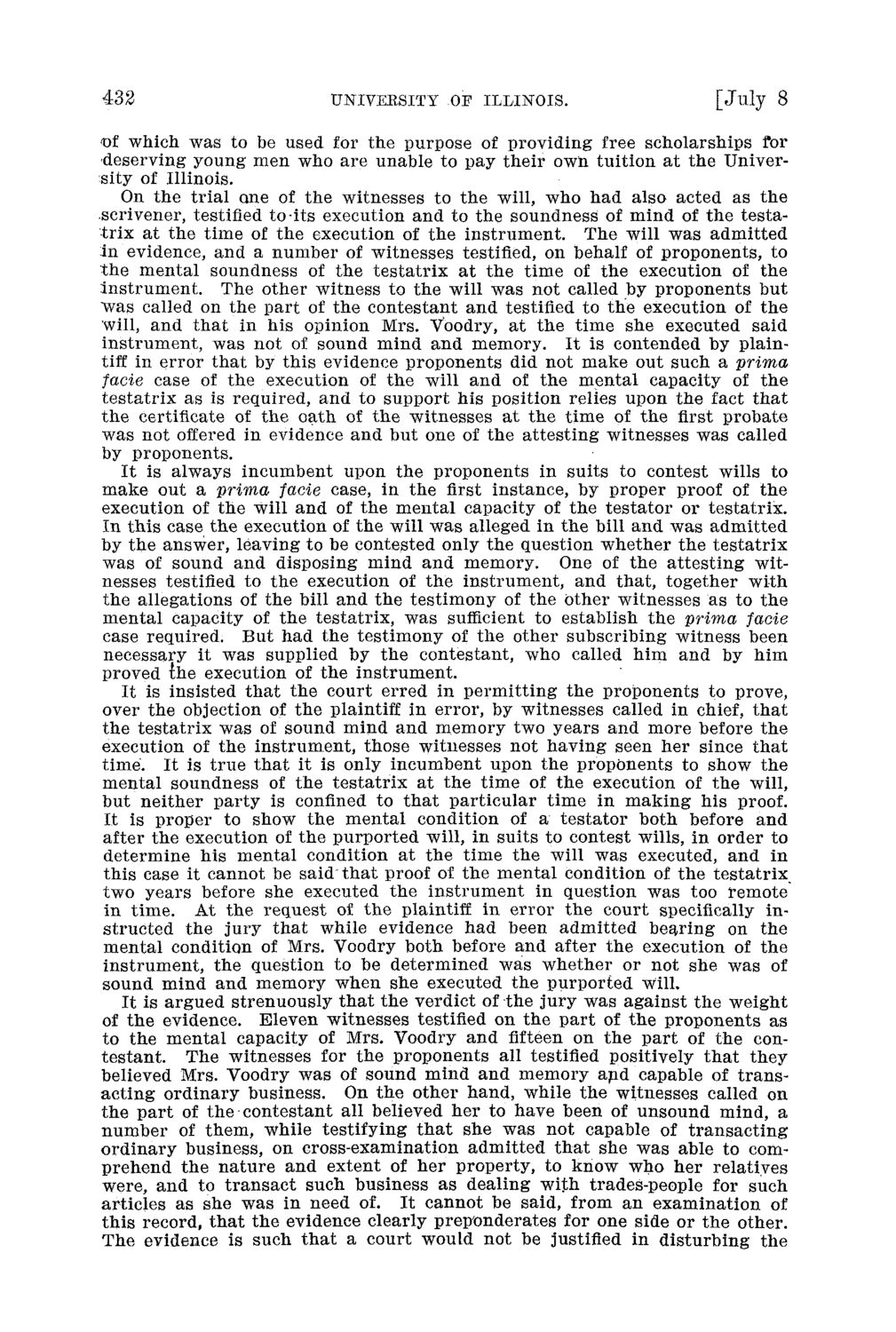| |
| |
Caption: Board of Trustees Minutes - 1912
This is a reduced-resolution page image for fast online browsing.

EXTRACTED TEXT FROM PAGE:
4.32 UNIVERSITY OF I L L I N O I S . [July 8 <of which was to be used for the purpose of providing free scholarships for deserving young men who are unable to pay their own tuition at the University of Illinois. On the trial one of the witnesses to the will, who had also acted as the scrivener, testified to-its execution and to the soundness of mind of the testatrix at the time of the execution of the instrument. The will was admitted in evidence, and a number of witnesses testified, on behalf of proponents, to the mental soundness of the testatrix at the time of the execution of the instrument. The other witness to the will was not called by proponents but was called on the part of the contestant and testified to the execution of the will, and that in his opinion Mrs. Voodry, at the time she executed said instrument, was not of sound mind and memory. It is contended by plaintiff in error that by this evidence proponents did not make out such a prima facie case of the execution of the will and of the mental capacity of the testatrix as is required, and to support his position relies upon the fact that the certificate of the oath of the witnesses at the time of the first probate was not offered in evidence and but one of the attesting witnesses was called by proponents. It is always incumbent upon the proponents in suits to contest wills to make out a prima facie case, in the first instance, by proper proof of the execution of the will and of the mental capacity of the testator or testatrix. In this case the execution of the will was alleged in the bill and was admitted by the answer, leaving to be contested only the question whether the testatrix was of sound and disposing mind and memory. One of the attesting witnesses testified to the execution of the instrument, and that, together with the allegations of the bill and the testimony of the other witnesses as to the mental capacity of the testatrix, was sufficient to establish the prima facie case required. But had the testimony of the other subscribing witness been necessary it was supplied by the contestant, who called him and by him proved the execution of the instrument. It is insisted that the court erred in permitting the proponents to prove, over the objection of the plaintiff in error, by witnesses called in chief, that the testatrix was of sound mind and memory two years and more before the execution of the instrument, those witnesses not having seen her since that time. It is true that it is only incumbent upon the proponents to show the mental soundness of the testatrix at the time of the execution of the will, but neither party is confined to that particular time in making his proof. It is proper to show the mental condition of a testator both before and after the execution of the purported will, in suits to contest wills, in order to determine his mental condition at the time the will was executed, and in this case it cannot be said'that proof of the mental condition of the testatrix two years before she executed the instrument in question was too remote in time. At the request of the plaintiff in error the court specifically instructed the jury that while evidence had been admitted bearing on the mental condition of Mrs. Voodry both before and after the execution of the instrument, the question to be determined was whether or not she was of sound mind and memory when she executed the purported will. It is argued strenuously that the verdict of the jury was against the weight of the evidence. Eleven witnesses testified on the part of the proponents as to the mental capacity of Mrs. Voodry and fifteen on the part of the contestant. The witnesses for the proponents all testified positively that they believed Mrs. Voodry was of sound mind and memory and capable of transacting ordinary business. On the other hand, while the witnesses called on the part of the contestant all believed her to have been of unsound mind, a number of them, while testifying that she was not capable of transacting ordinary business, on cross-examination admitted that she was able to comprehend the nature and extent of her property, to know who her relatives were, and to transact such business as dealing with trades-people for such articles as she was in need of. It cannot be said, from an examination of this record, that the evidence clearly preponderates for one side or the other. The evidence is such that a court would not be justified in disturbing the
| |